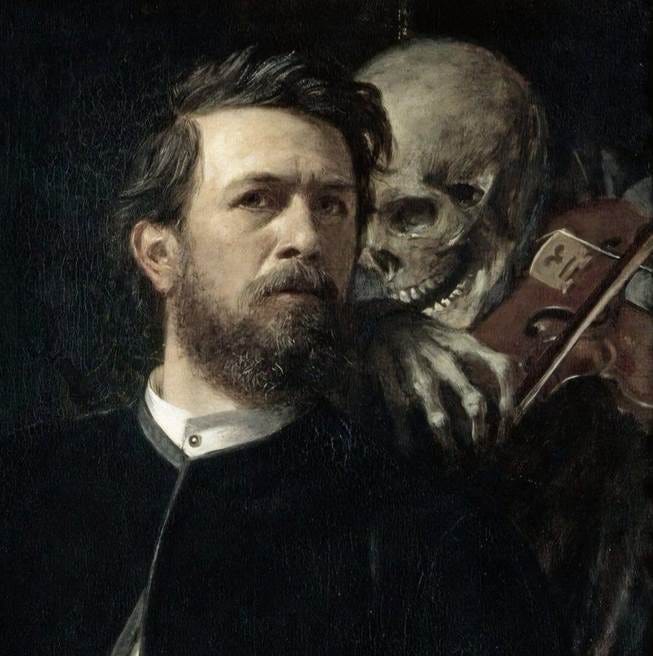On the Nature of Evil, Demons, and Spiritual Warfare
The war for the human soul…
We are at war. Yet, this is not a war for land, gold, or temporal dominion. It is a war for the most precious reality you possess – your immortal soul. To understand the nature of this war, one must first understand the nature of the enemy – an enemy that is ancient, intelligent, and relentless.
Let’s explore the nature of evil, and how to combat it…
Reminder: you can get tons of useful members-only content and support our mission for a few dollars per month 👇
Two full-length, new articles every single week
Access to the entire archive of useful knowledge that built the West
Get actionable principles from history to help navigate modernity
Support independent, educational content that reaches millions
The Origin and Nature of Demons
According to the perennial teaching of the Church, demons are not mere symbols of evil, nor are they the disembodied spirits of the wicked dead. Demons are fallen angels; pure spirits created by God in the first instances of creation, endowed with intellect and will, and ordered toward the worship and service of their Creator.
Like man, the angels were created in a state of trial, possessing the freedom to choose either obedience or rebellion. Theologians and exorcists alike hold that each individual angel’s fall was tied to a particular revealed mystery. Some fell because they rejected the concept of divine mercy, others rejected the future Incarnation of the Word, and others rejected the economy of grace by which man – a creature of flesh – would be exalted above them in glory.
In that primordial instant, some angels, illumined with knowledge of God’s plan for salvation, chose to serve, whereas others refused – hence Lucifer’s infamous declaration “non serviam” or “I will not serve”.
The rebellion was not uniform in rank or nature. God, in His wisdom, created nine choirs of angels – Seraphim, Cherubim, Thrones, Dominations, Virtues, Powers, Principalities, Archangels, and Angels – each with distinct powers and offices. When they fell, they retained both their angelic nature and their hierarchical distinctions. Thus Lucifer, once a Seraphim, remains of higher natural power than demons of lower choirs who reign in hell.
The Malice of the Fallen Angels
The angelic intellect is vast, penetrating, and unbound by the limitations of time and space. Rather than using these to glorify God, the demons turned these powers toward the ruin of mankind, whom they hate precisely because man is made “in the image and likeness of God”. Their malice is sharpened by their envy, for although they surpass us in the order of nature, human beings can come to surpass them in the order of grace – to the point of taking the thrones they abandoned in Heaven.
However, the demons’ power is not absolute. All of their actions occur only by God’s permission, either actively willed or passively allowed according to Divine Providence, so even in their rebellion, they can not cross the bounds which God has established for individuals and societies.
The Demon’s Knowledge and Strategy
The demons possess a near-perfect grasp of salvation history, Sacred Scripture, and prophecy. From the beginning, they knew certain truths: that sacrifice is necessary to appease God; that a virgin would bear a Savior; and that the Messiah would die and rise again to redeem the world. They have used this knowledge to counterfeit divine revelation, seeding false religions with distorted fragments of truth.
Thus, in the pagan world, we find recurring motifs of virgin births, sacrificial rites, dying-and-rising gods, not because these myths are the source of Christianity, but because demons, knowing the shape of God’s plan, wove its outline into their deceptions to sow further confusion and doubt.
In antiquity, the demons manifested as the very gods men worshiped and adapted their appearance to the culture’s imagination. Baal to the Canaanites, Odin to the Norsemen, and Huitzilopochtli to the Aztecs. These Gods demanded blood – even the blood of children – to bind men in superstition and savagery and prevent them from coming to the knowledge of God.
In the modern age, demons cloak themselves in the language of science fiction, appearing as “interdimensional beings” or “extraterrestrials,” luring men to reject both faith and reason, to embrace vice, and to sacrifice their children in subtler but no less real ways – whether for temporal gain, convenience, or in the name of progress.
Throughout history, demons have enticed men with secret knowledge or technologies beyond their natural capacity, and all that they demand in return is submission and worship.
The Modes of Demonic Action
Demons can act upon both the material world and the human mind. They may manipulate physical objects, producing phenomena such as levitation or unexplained movements. More dangerously, they can act upon the imaginative faculty – the material aspect of our intellect – implanting images, suggestions, and temptations within the mind. This is why faith must never rest upon mere emotional experiences or the pursuit of “signs and wonders”, as these phenomena can be manipulated by external, supernatural forces.
For this reason, the Scholastics maintain that we must not worship God in the hope of spiritual consolations, but because justice demands that we render to Him what is His due. Any spiritual gift beyond this is gratia gratis data – a grace freely given.
The Hatred of the Enemy
The demons’ hatred burns most fiercely against the Blessed Virgin Mary, for in her they are confronted with the ultimate reversal of their rebellion: a creature lower than the angels exalted above them, utterly faithful to God, and instrumental in their defeat. Her humility is the antithesis of their pride.
“And Mary said: My soul doth magnify the Lord and my spirit hath rejoiced in God my Saviour. Because he hath regarded the humility of his handmaid; for behold from henceforth all generations shall call me blessed. Because he that is mighty, hath done great things to me; and holy is his name. He hath showed might in his arm: he hath scattered the proud in the conceit of their heart. He hath put down the mighty from their seat, and hath exalted the humble.” – Luke I.46-52
Degrees of Demonic Assault
The Scholastics explain that there are several degrees of demonic assault, each representing a deeper level of intrusion into the life of the victim. When the individual commits grievous sins, engages in occult practices, or uses hallucinogenic drugs – which impair reason and weaken the will – these open the door to deeper and more powerful demonic influence.
Temptation is the most common and universal, wherein demons appeal to disordered desires and weaknesses of the victim in order to draw their soul towards sin.
Oppression occurs when the attack becomes external and tangible. In oppression, demons stir hostility in those already under their influence to afflict the victim, or disturb the environment around the victim in order to sow chaos and disorder.
Obsession is marked by persistent and intrusive thoughts, images, or impulses, often accompanied by intense spiritual desolation and despair in order to weaken the resolve of the victim.
Possession, the most extreme form of attack, involves the demon taking control of the body – though never the soul – of the victim. In such cases, the victim can perform supernatural feats such as superhuman strength, the ability to speak unknown (usually ancient) languages, has knowledge of hidden things, demonstrates a violent aversion to sacred objects or the name of Christ, and radical changes in personality. Only the authority of Christ, exercised through the Church’s solemn rite of exorcism, can expel a possessing spirit.
The Economy of Grace and the Limits of Demonic Power
Despite their rebellion, demons remain bound by the order of creation, the economy of grace, and the sacraments. They recognize the spiritual authority God has established, particularly within the family.
When a father – the spiritual head of his household – commits grave sin, he weakens the spiritual defenses of all under his care, exposing them to demonic attack. Likewise, grave sin committed in a particular place can give demons a kind of claim over that location.
They attack according to the vulnerabilities of each soul. To the pleasure-seeker, they attack with temptations of lust or gluttony, and to the disciplined ascetic, they attack with temptations of pride or wrath.
The Christian’s Defense
The surest defense against demonic assault is not merely natural vigilance, but supernatural life. To remain in a state of sanctifying grace is to dwell in the friendship of God, which no demon can penetrate without our consent. Prayer, fasting, penance, and frequent reception of the sacraments strengthen the soul’s resistance.
St Thomas Aquinas maintains that the body adjusts itself to the operations of the soul. Those who commit grievous sins and abuse their nature are more susceptible to sin – and this has a spiritual and physiological effect. In his Summa Theologiae, he writes that “grace perfects nature”, thus, virtue and grace strengthens the will and enlightens the intellect, and together these transform the soul into a spiritual fortress.
Although demons are formidable foes, they are powerless before a soul united to Christ.
The Final Victory
Evil is not an equal and opposite force to good, but a privation. The demons, for all their power, are creatures, and their rebellion is permitted only so that God’s justice and mercy may be more perfectly revealed.
The war for your soul is fierce, but victory belongs to Christ and those who fight for Him.
“But he that shall persevere to the end, he shall be saved” – Matthew XXIV.13











Reading the article’s take on demons (as fallen intelligences who still keep some trace of their angelic order) brought something important to mind: evil doesn’t create, it only twists. Light brings clarity and form, but demonic influence breaks things apart, shatters, corrodes.
They unravel meaning instead of building it. Virtue, on the other hand, isn’t just about doing the “right” thing. It’s about staying in tune with the way being itself is structured. To live virtuously is to hold steady at the center, resisting the pull of fragmentation, and staying gathered in the order God intended.
you write with such authority. where have you learned this truth? where is the detail of angels and fallen angels written in the bible? I dont disbelief but i do question?